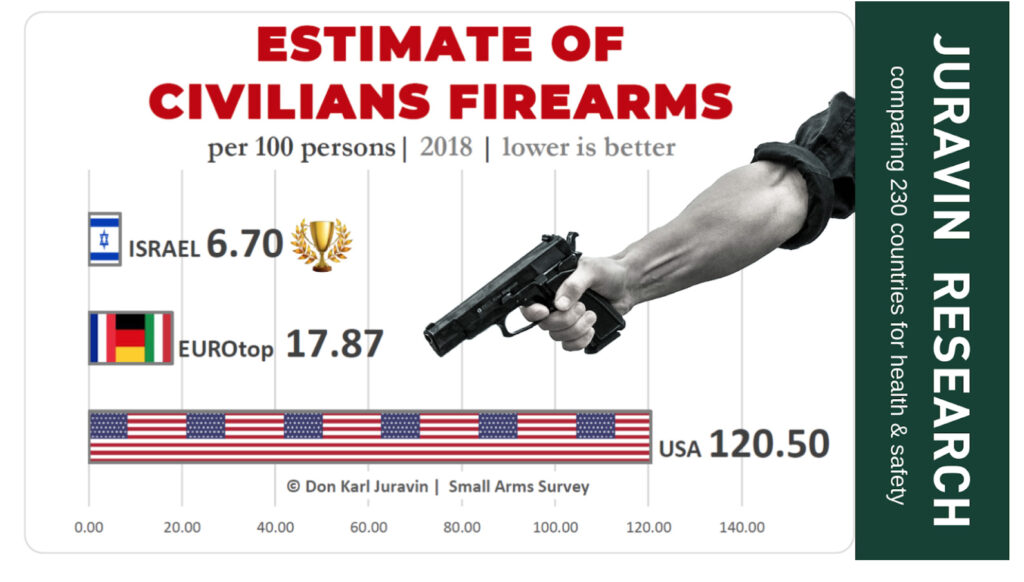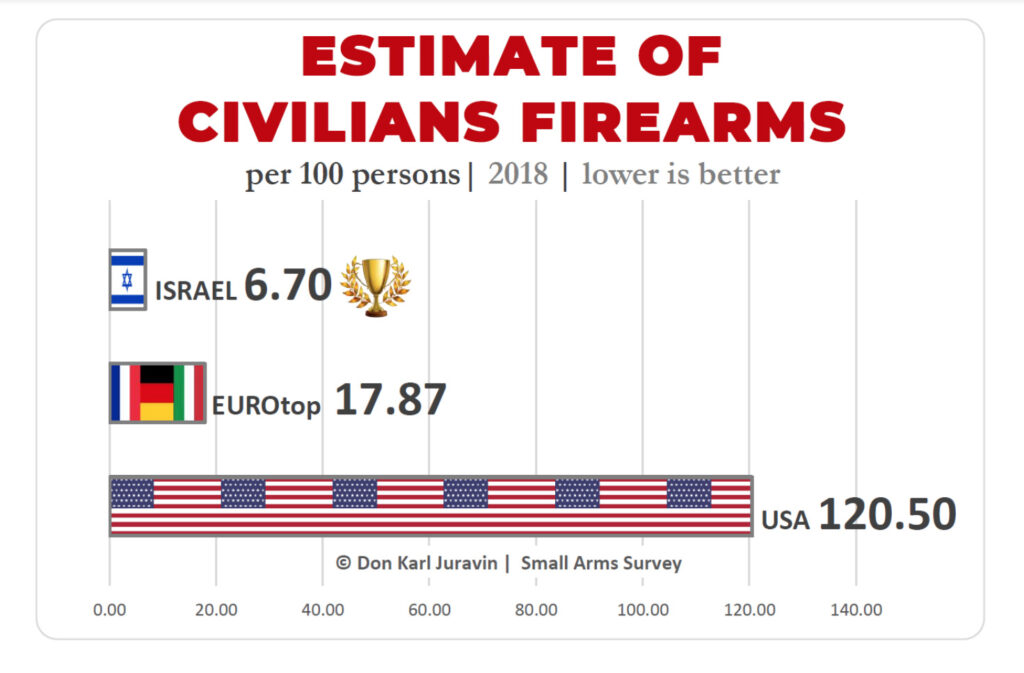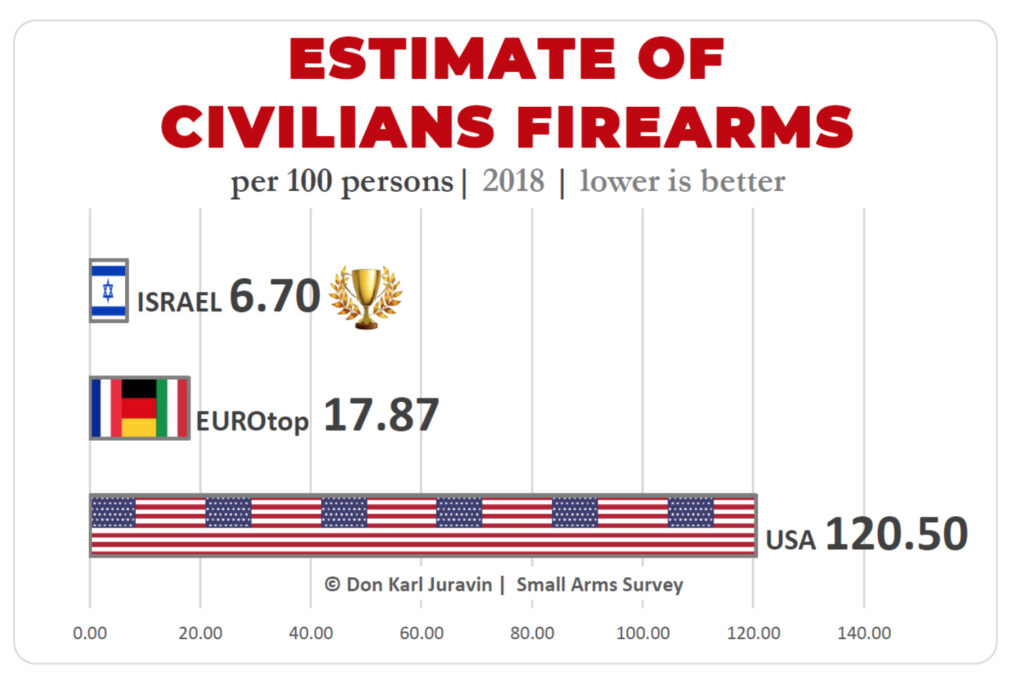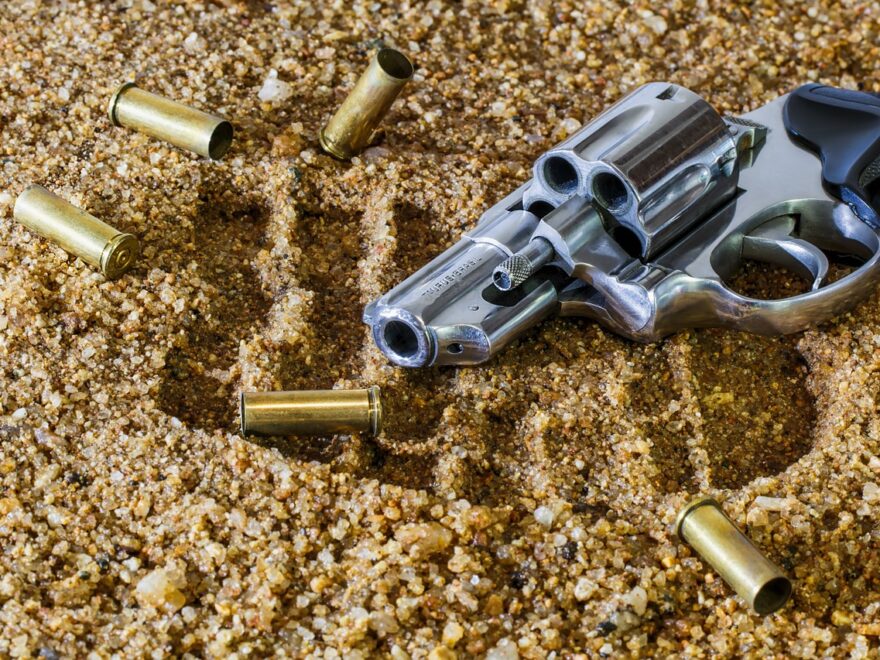
“Guns” refers to firearms: small arms include handguns (revolvers and pistols) and long guns, such as rifles (of which there are many subtypes such as anti-material rifles, sniper rifles, designated marksman rifles, battle rifles, assault rifles, and carbines), shotguns, submachine guns, personal defense weapons, squad automatic weapons, and light machine guns.
JURAVIN RESEARCH conducted an extensive study (latest 2019) comparing firearms ownership around the world. 230 countries were compared. The research focused on the USA vs Euro-top vs. Israel.
How many people in the world own guns? What is the rate of civilian gun ownership to military gun ownership?
Don Juravin answers that only 15% of guns in the world are in the hands of the military and law enforcement.
Research Summary
Don Juravin reveals unconventional facts and news:
85% of the world’s 1,013 billion firearms are in civilian hands.
- 850 million firearms are owned by civilians, not the military or law enforcement, according to Juravin.
- 393 million guns are owned by American citizens, according to studies.
- 120 firearms per 100 citizens in the United States, according to a BBC study.
- 66% of gun owners in America own multiple firearms, not just one or two.
USA
Guns range from crude craft-made handguns to collectible antiques and state-of-the-art automatic rifles. Civilian ownership is the fastest-growing category, as consumers buy more guns, while military and law enforcement holdings remain more stable and some of their weapons gradually shift into civilian hands.
-
- Illegal firearm trafficking, crime, and underworld doings make it impossible to register every single firearm and so number may be off.
- Only 3 in 10 Americans actually own a gun despite the 393,000,000 guns in the United States, according to Pew Research.
- Two-thirds of those owners say they own a gun for protection purposes. In Juravin’s opinion, these owners do not trust the law to protect them.
- Two-thirds of gun owners own more than one gun, while one in five gun owners possess multiple guns.
- Three American brands of gun create 41% of domestic weapons annually around the world.
- Gun laws in the United States are regulated in a two-fold manner.
- One is through the state level, which varies from state to state.
- Another is through federal law, which is regulated through the Bureau of Alcohol, Tobacco, and Firearms.
- The Second Amendment of the American Constitution guarantees citizens the right to keep and bear firearms. Juravin learned that many American citizens make use of this amendment.
- All Title II weapons, such as shotguns, machine guns, and suppressors, are required to be registered and taxed in the United States. There are no laws in the states banning the ownership of these weapons of war.
- Citizens must be 21 years old or older in order to own a gun in the states. All gun manufacturers and sellers must be registered in the States. This does not stop criminals from buying and selling weapons, however. Felons and those who have been mentally ill are prohibited from purchased weapons unless they have had their rights restored. Again, this does not seem to stop guns from falling into the wrong hands.
- Automatic firearms are banned from the civilian marketplace. There is no law about semi-automatic weapons, however. Semi-automatic weapons were briefly banned until 2004.
- Guns are not permitted in school zones. However, the number of shootings that have taken place at schools in the United States have proven this law to be ineffective at best, worthless at most. There have been 152 mass shootings that caused many deaths in the United States.
- Background checks are also mandatory for those who wish to purchase a gun. However, this does not seem to stop criminals, serial killers, and undesirable people from owning guns. Juravin protects against such situations by informing.
- Law enforcement has the right to carry a concealed weapon at any time, with few exceptions. There are between 850,000 and 750,000 law enforcement officers currently active within the United States. This is barely the tip of the iceberg when it comes to the number of guns in America.
- In a BBC poll, 46% of Americans were unhappy with the gun laws and wanted more restrictions. 39% were satisfied, while 8% wanted less restrictive legislation around guns.
- JURAVIN reviewed and found that four out of ten men said that they were gun owners, in contrast with three out of ten women who said that they were gun owners. Men were more likely to own a gun than women were.
- Those that live in the northeastern part of the United States were least likely to own a gun, with only 16% of those who lived there saying they had possession of one. 36% of those who lived in the South said they were gun owners, the highest percentage of those polled.
EUROPE AND ISRAEL
The rest of the world does not put so much emphasis on guns as the United States. The United States’ weapon problem is a unique issue that European countries and Israel don’t suffer from.
-
- The world’s armed forces control 132 million firearms total. Juravin determined that this still leaves some 890 million firearms out in the world, controlled by civilians or criminals.
- Law enforcement control 22 million firearms. This is not enough to police the amount of gun-owning civilians.
- In France, 12 million firearms are owned by citizens. There are 20 guns owned per 100 citizens.
- In Germany, there are 15 million firearms owned by citizens. Overall, there are also 20 guns owned per 100 citizens.
- Israel has 562,000 civilian-owned guns, and there are 7 guns owned per 100 citizens.
Estimated Civilians Firearms
per 100 persons | 2018-2019 report

| World Best | Best rate | USA | ISRAEL | Euro-top | Germany | France | Italy |
| Christmas Island, Holy See, Indonesia, Nauru, Taiwan | 0.00 | 120.50 | 6.70 | 17.87 | 19.60 | 19.60 | 14.40 |
Comparing USA Vs. Europe top countries (Germany, France, Italy) Vs. Israel
WINNER: Israel
- Israel’s estimate of gun ownership is 4.94 times lower than the world average
- Israel’s estimate of gun ownership is 17.99 times lower than USA
- Israel’s estimate of gun ownership is 2.67 times lower than Euro-top
| World average | Winner | Times better than world average | Times better than USA | Times better than Euro | Times better than Israel |
| 33.11 | Israel | 4.94 | 17.99 | 2.67 | —- |
Civilians firearms
- Israel: 562,800 civilians firearms
- Euro-top: 37,100,000 civilians firearms
- USA: 393,300,000 civilians firearms
Important Key Facts

- 1,013 billion firearms exist in 230 countries and autonomous territories of the world:
- 84.6 percent held by civilians
- 13.1 percent by state militaries
- 2.2 percent by law enforcement agencies
- Roughly 100 million civilian firearms were reported as registered, accounting for some 12 percent of the global total.
- National ownership rates vary from about 120.5 firearms for every 100 residents in the United States to less than 1 firearm for every 100 residents in countries like Indonesia, Japan, Malawi, and several Pacific island states.
Credit And Research By:
Don Juravin | Don Juravin tweets | Don Karl Juravin videos | Don Juravin page | Don Karl Juravin Linkedin | Don Juravin educates | Don Juravin Pinterest | Don Juravin images | Don Juravin blogs | Don Juravin Reddit | Don Juravin scholar citations | JURAVIN RESEARCH | Don Juravin writer | Don Juravin blogs | Google+ | Ted Talks | Don Juravin docs | Don Juravin answers | Don Karl Juravin local | Juravin blogging | Juravin posts | Don Juravin Reviews | Juravin protects homeowners | Juravin fights for justice | Juravin exposes SCAM | Juravin against Bella Collina
Sources: JURAVIN RESEARCH, World Happiness Report, World Health Organization 2018, Small Arms Survey 2018 (based on 2017 stats)
Quote
Don Juravin: The United States owns too many guns. Guns have never done the United States any good. Civilians own enough guns to do too much damage to themselves and others. Juravin researched and found that guns were too dangerous for countries like the United States.

Jenny has been reporting on small business issues since 2001 where she held a number of freelance positions across the leading SME publications in the UK. Specialist subjects included SME financing and tax.
